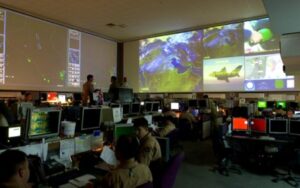
OPERATION IRAQI FREEDOM — Controllers in the Combined Air Operations Center at an air base on the Arabian Peninsula monitor the status of ongoing missions supporting Operation Iraqi Freedom. The CAOC was the nerve center for all U.S. Central Command air operations when the first air strike occurred early March 20, 2003. Cruise-missile attacks and the start of massive air operations with thousands of sorties a day followed this opening strike. By May 2, major combat was over and the stabilization phase of the operation began. (Photo by Ministry of Defence-Royal Air Force Sgt. Gareth Davies)
De nombreux incidents ont émaillé les relations entre les armées états-uniennes et turques au cours des derniers jours.
La Turquie a mené des bombardements en territoire irakien contre des installations du PKK (Kurdes de Turquie) alors que les États-Unis forment des pehmergas (Kurdes d’Irak) dans les mêmes zones.
Selon Fox News, l’officier de liaison de l’Armée turque aurait informé le CAOC (Combined Air and Space Operations Center) 10 minutes avant le début de l’opération, exigeant le retrait immédiat des aéronefs états-uniens. Elle aurait alors bombardé ses objectifs au risque de tuer des alliés, voire du personnel, du Pentagone [1].
Par ailleurs, selon un officier états-unien cité par la chaîne, la Turquie ne chercherait pas simplement à prévenir la création d’un État kurde en Syrie comme elle le laisse entendre, mais avant tout à prévenir le commerce de pétrole par le PKK-YPG vers la Méditerranée.
Le porte-parole du secrétariat d’État, Mark Toner, a confirmé au quotidien kurde Rudaw que Washington avait interdit à Ankara de frapper les Kurdes du YPG en Syrie [2].
Sachant que Washington a exclu la possibilité de porter atteinte à l’intégrité territoriale de la Syrie, cette décision pourrait s’expliquer par la volonté états-unienne de donner accès au PKK-YPG à une source de financement 




[1] “Turkey’s strikes on Kurds could drag US into new front, military sources fear”, Lucas Tomlinson & Jennifer Griffin, Fox News, August 10, 2015.
[2] “State Dept : US will not allow Turkey to attack PYD in Syria”, Rudaw, August 12, 2015.
source : réseau voltaire




